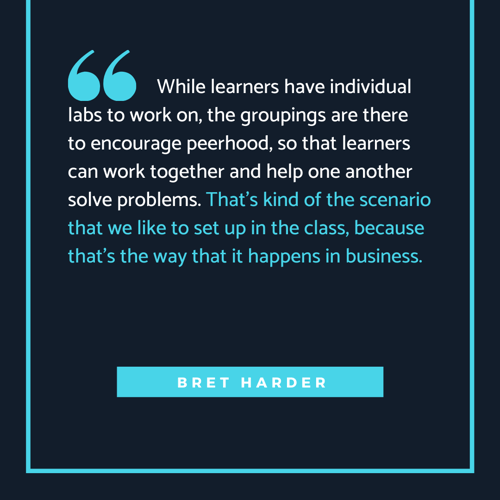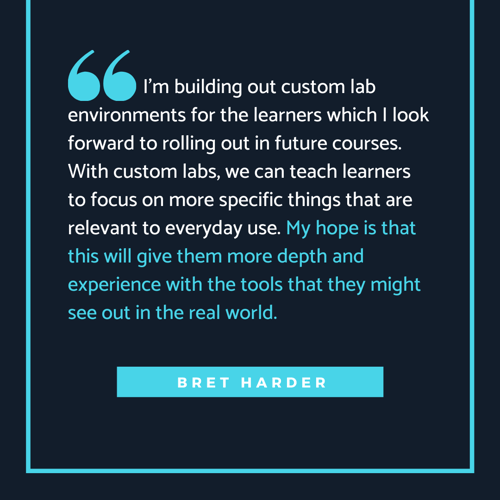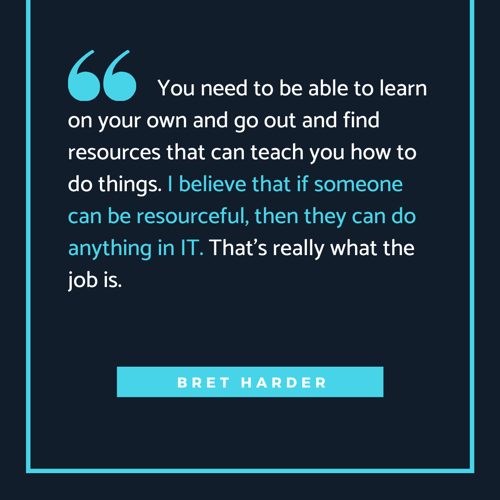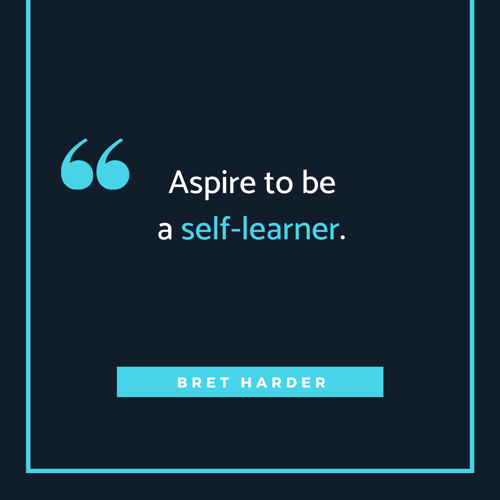Divergence Blog
Latest
- Red vs Blue: Decoding Cybersecurity Team Roles
- From Teacher to Tech Pro: Your Guide to a Rewarding Career Transition
- Navigating the VET TEC Pause: Choosing the Right Path for Tech Education.
- The Future of Work in the Age of Quantum Computing and AI
- What is Capture the Flag?
- KQL vs SQL
- How to Advance Your Career with Advanced Postgres
- Alumni Series: How Michael Williams Became a Cybersecurity Pentester
- A Veteran Success Story with Antonio Grant
- Leveraging a Cybersecurity Bootcamp to Launch a Career in Tech
Meet Our Instructor: Bret Harder, Network & Security Expert
“Aspire to be a self-learner. It’s as easy as finding a YouTube tutorial that will walk you through step-by-step, command-by-command. It’s important to be able to pursue self-study and seek out resources and just sit down with yourself and spend time trying new things. Understand as well that sometimes what you’re trying will fail. But you have to try and try again.”—Bret Harder
Bret Harder is Divergence Academy’s Network and Security Operations Lead, which makes him responsible for Divergence’s network and infrastructure. A former Tier 3 Microsoft Premier Support Engineer, he holds certifications from CompTIA and FortiNet.
Thank you, Bret, for joining our Instructor Perspectives series. To start, will you tell us a bit about your background prior to joining Divergence Academy?
I've worked in different areas of IT for most of my adult life - I've worked in cell phone technical support, computer sales and repair, and also in Managed Services Provider support. And while I did go to college for some classes, I never got a degree. So it’s accurate to say that these skills weren’t skills that I gained from school. My IT learning was acquired through self- education. If I was interested in a certain skill set or topic, I looked up resources online.
I started out working for a small internet service provider in Oklahoma. They were a wireless internet service provider and while working for them, I learned Linux, server management, and networking. The experience was like an internship.
Because the company was small enough that they didn’t know the different aspects of network security, it was a learning experience for all.
Please share how you got interested in cybersecurity - or security to be exact.
When I was in high school, we had a programming class where I learned Quick Basic - which is a fairly old programming language. I was also interested in online games, and I read tutorials and learned how to set up my own Quake and Counter Strike servers using Linux.
So you could say that my interest in security and cybersecurity stemmed from a game I enjoyed and was interested in way back when I was a kid. Learning the programming language means you learn how to write programs.
One of those programs that I wrote back in high school was a blackjack program. It was an extra credit project and I remember it still because I spent a lot of time on getting it to work really well. Another program I recall is this one that would let us turn code into music. We turned everything that was popular at that time - like Metallica songs - into computer music through it.
So, that’s what got me started. And then over the years, I retained the interest in programming., and security became another layer on top of all that.
That’s interesting! Now how did you learn about Divergence Academy?
Another Divergence instructor, Logan Hillard, let me know there was an opportunity. Logan and I worked together previously at Microsoft on the networking team.
Gotcha, word of mouth referral is pretty strong here. At Divergence, most of our programs are split into different modules, each module taught by different instructors. Can you describe to our audience the rationale behind the different instructors for the different modules?
It boils down to different people having different areas of expertise.
The reason why there’s a handover to another instructor is that although I have personal interest in pentesting, I've never devoted enough time to becoming an expert to be able to teach it.
At Divergence, we have different modules covering different topics. Because of that, it’s only appropriate to have different instructors that are experts in those areas. It's very hard to be an expert in everything, so you’ll often find that there's a lot of people that are an expert in one subject, but not all of them. It’s also a way to spread out the load so that learners get the best learning from the best in the industry.
Makes sense! How about your teaching style? Can you give us a brief walk-through on how you explain terminologies and more obscure concepts?
I try and focus on how things are relevant. In all the different topics that I teach, I try and explain how it's relevant to our current business uses.
A lot of the times we do have to cover stuff that is history or legacy technology, which are things that are older and may not be used as much today. But I really like to point out to learners the differences in these technologies and what is current, because that’s what they'll see when they get out into a job. I believe it’s important for them to be aware of that, because it lets them know what to focus on.
Other than that, I try and cover everything in as much detail as I can. I like to use analogies. With peers that are already familiar with tech terms, we tend to employ analogies referencing other technology. In this training environment, because learners don't have robust familiarity yet, we turn towards more general analogies referencing everyday, real-world things.
Begs the question: what is an average day in your classroom like?
Right now, I'm teaching through most of the modules for this cohort, all the way up until Pentesting; which will be taught by someone else. In the last two weeks, we wrapped up Server+. As of this interview, I’m taking the class through Linux+ and then next week, I’ll be teaching Cloud+. After that, we’ll cover Network+ and then Network Tools.
The classes I'm teaching are 4-hour days. Each one has a bit of a different structure from the 10-hour classes that I’ve taught.
In my 4-hour days, we generally spend the first 10 to 15 minutes of class introducing something that's outside of the actual content.
This can be from a tutorial on the web, or a YouTube video that walks people through a tool we might use that day. Hack the Box, for example, is a website where we do pentesting scenarios and labs. Overall, I find that starting the days off with something more interesting than book content helps to kickstart the class on a high energy note.
What about the discussion portion of your class? What is that like?
We start with slides that go into a specific topic depending on where we left off the day before. As we go through it, learners ask questions and let me know if there’s anything that they don't understand.
I also bring up the engagement questions from the slides and let the learners have the floor so they can respond via a group Q&A. Lab is next. This designated time is for learners to apply what was covered in the slides during discussion to different real-world scenarios.
Let's explore the labs a little more, shall we?
The lab instructions are conducted like vendor instructions. They simulate a scenario that might happen if we were setting up a product from a vendor in a business. It's really about giving the learners experience in something they might encounter on the job..
While learners have individual labs to work on, the groupings are there to encourage peerhood, so that learners can work together and help one another solve problems.
For example, in a company where I'm a member of the Network Team, if I try to get something done and I'm having trouble with it, I'm going to reach out to other members of my team and we're going to resolve the issue together. That's kind of the scenario that we like to set up in the class, because that's the way that it happens in business, and it’s good for learners to have that experience.
And in case they can't resolve the issue, I'm there to jump in and help them out. But learners are really good at working through problems and if any questions come up from the lab, we cover it in a discussion after our lab time.

Apart from these small group labs, how do you keep learners engaged in a virtual classroom environment?
One thing that I like to do is just respect their time. I don't like to waste any time covering anything that they're not here for.
Everything that we cover in class is all geared towards helping them learn and be engaged. The coursework itself is very good at building engagements, because the labs are designed to enable learners to interact. They can't sit back and listen, like they might if I was just talking to them the entire time.
What would you say you enjoy most about your work? What inspires you?
I think I'm unique as an instructor in that I have a dual role. Yes, I am an instructor, but I'm also the Network and Security Lead for Divergence Academy and I'm also responsible for Divergence’s infrastructure.
Right now, I'm building out custom lab environments for the learners which I look forward to rolling out in future courses. Learners are currently working through pre-designed labs that supplement the course content. With custom labs, we can teach learners to focus on more specific things that are relevant to everyday use. My hope is that this will give them more depth and experience with the tools that they might see out in the real world.
On the teaching side, I like how I’m able to help people learn the different technologies. A lot of times in tech, all it takes is that moment when you ask a techy question to a non-techy person and they answer the question correctly. You know they finally get it. Being on the side that helps learners arrive at those answers is really fulfilling.

Going back to the labs you're developing, it sounds like they will really amplify the application-centered training model that drives the heart of Divergence Academy.
My hope is that we can turn the custom labs into a process where learners keep building on layers of learning. As I mentioned earlier, what we have right now are labs that are tied specifically to the coursework. In the current setup, if learners break something in one lab, it doesn't affect the next one so they can just move on without any real repercussion.
What I hope to do is to put learners in a scenario where when they break something, they have to fix it. I feel that would be a better scenario for shaping them to become stellar technicians and trouble-shooters.
What would you say are your biggest challenges teaching in our remote-live classroom setting?
We’ve hit a point where we can deliver the content easily through screen share on Microsoft Teams. We also have the capability to record the content. This means that learners who may have to step away from the lesson can refer to it later in the day. Our labs are already available 24/7, and that allows learners to experience the labs in their own time.
Having said that, the biggest challenge comes down to making sure that learners are engaged with the content. It’s always about engagement. You want to make things interesting for them. Sometimes it just takes letting them know that the topic we might be covering are things that are good to know in the background. It might not be the most exciting part of class, but we still need to know it. Even highlighting that for them helps.
You've been teaching at Divergence for about 3 to 4 months now [as of Feb 4th, 2021]. Have there been any proud moments while teaching?
I’ve had a learner let me know that they set up a virtual machine on their home computer in an attempt to mimic a scenario they saw on the Internet. Another time, a learner let me know that they tried to go through the process of hacking machines via Hack the Box.
Any time that a learner tells me that they're engaging in self study, that's what always makes me feel great! That sense of initiative is what gets us through this industry.
Interesting. That self-initiative and DIY mindset has been one of the common themes throughout this Instructor Perspectives series.
You need to be able to learn on your own and go out and find resources that can teach you how to do things. I believe that if someone can be resourceful, then they can do anything in IT. That's really what the job is.

As an emerging tech school, what kinds of technologies would you like to see implemented to better engage learners virtually?
I do think the regular tools that we currently use do a really good job. But I’d like to go back to the labs that I'm working on. While they’re not classified as future technology, these labs will help our learners by providing a more enriched space to experience what they might encounter in the real world.
Our current structured labs are very step-by-step. They’re great, but the labs that we're developing are going to be completely open- ended where learners are free to do whatever they want. They can do a lot of testing and other things that they don't have the ability to do right now.
I am really curious to see how learners start using them. While I have ideas on how I want to see learners using them, I’d like to know how the learners will make these labs their own. That’ll be interesting to see.
To round out this interview: what’s your best advice for someone who is interested in pursuing cybersecurity as a career?
Aspire to be a self-learner. When I was young and learning, we didn’t have the Internet because it was just becoming a thing. I didn't have Google or Wikipedia or any of the other resources that are now out there. It was very hard to learn and you had to know someone that knew something. Or you could buy a book, but oftentimes, the books were always outdated because technology moves so fast.

Today, you can find almost everything on the Internet. And if you want to learn how to do something that you’ve never done before, it’s as easy as finding a YouTube tutorial that will walk you through step-by-step, command-by-command. It’s important to be able to pursue self-study and seek out resources and just sit down with yourself and spend time trying new things. Understand as well that sometimes what you’re trying will fail. But you have to try and try again.
We are the leading vocational trade school for emerging technologies with industry experts as our instructors. Gain relevant skills and meet the demands of an evolving landscape by signing up for our courses today.
View our course catalog or reach out to us and speak to a member of our team today!
